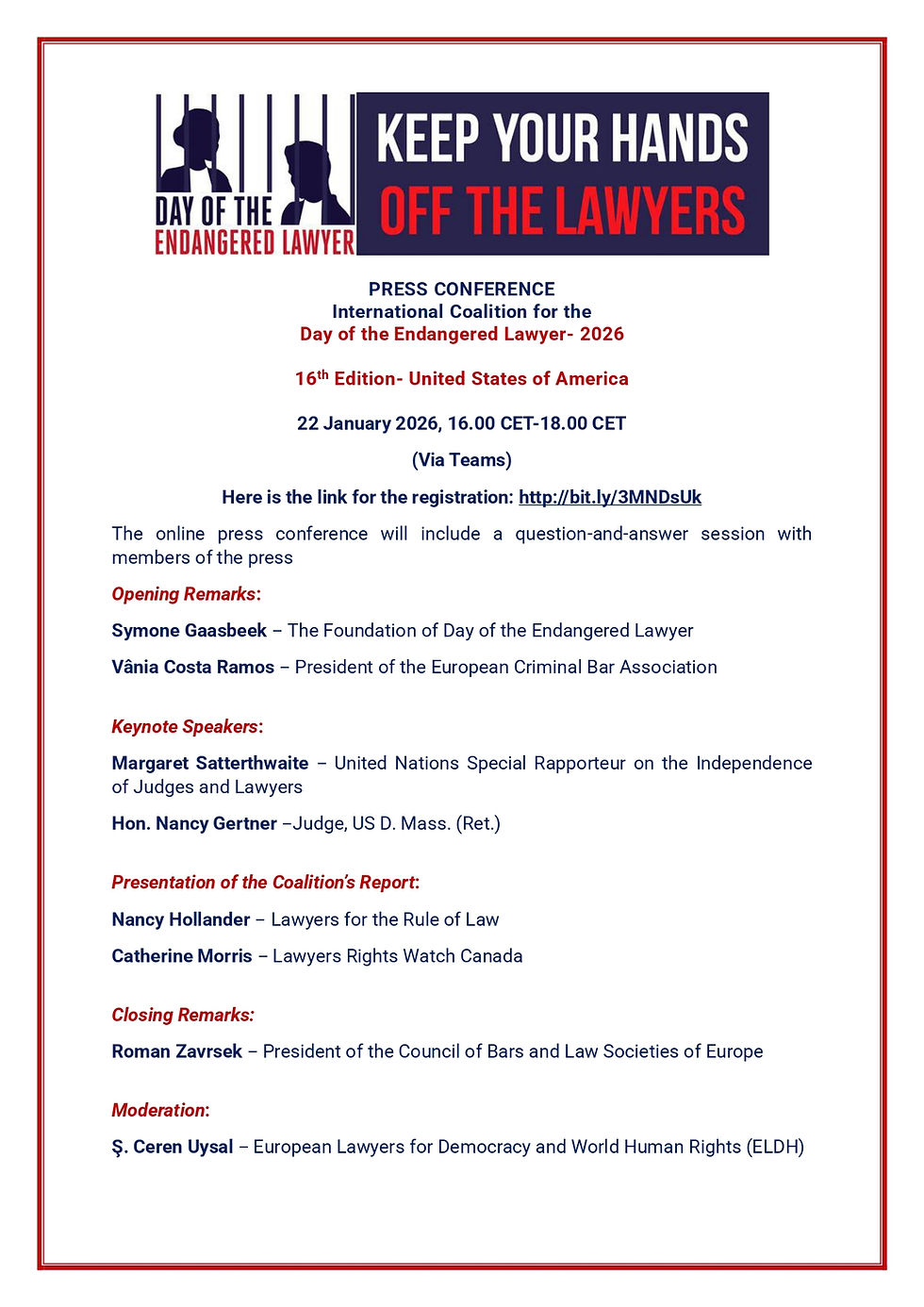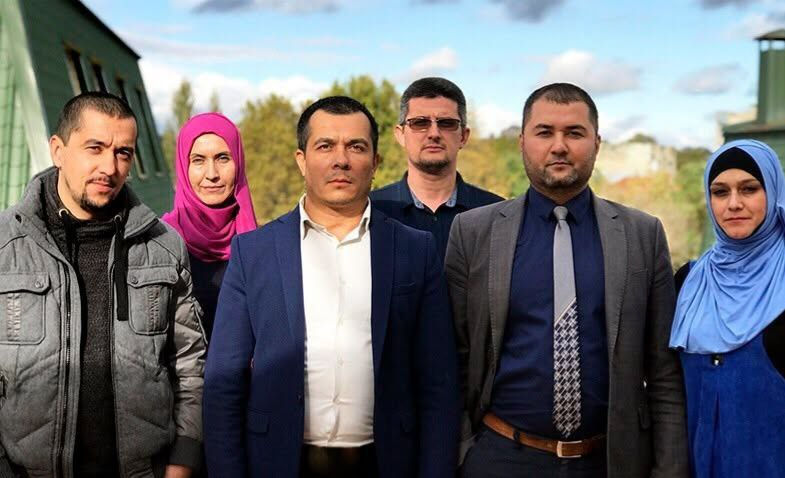Statement "On the Mass Persecution of Lawyers (Advocates) in Connection with their Prolonged Stay Outside the Russian Federation"
- iaramail88
- Nov 12, 2025
- 7 min read
In response to numerous appeals from lawyers (advocates) regarding the campaign of mass persecution of lawyers (advocates) in connection with their prolonged stay outside the Russian Federation, the General Council of the International Association of Russian Advocates deems it necessary to declare the following.
On April 22, 2024, Federal Law No. 83-FZ «On Amendments to the Federal Law «On Advocacy and the Legal Profession in the Russian Federation»» was adopted[1]. The law establishes that the status of a lawyer (advocate) may be terminated by decision of the council of the bar association, based on the conclusion of the qualification commission, in the case of the lawyer's departure for permanent residence or for a period exceeding one year outside the Russian Federation, except for departure for treatment or education, or for accompanying family members sent to perform labor or other duties outside the Russian Federation by state authorities or Russian organizations, or for other valid reasons (subparagraph 7 of paragraph 2 of Article 17)[2].
Prior to the adoption of the law, Mariana Katzarova, the UN Special Rapporteur on the situation of human rights in the Russian Federation, and Margaret Satterthwaite, the UN Special Rapporteur on the independence of judges and lawyers, addressed a statement to the Minister of Justice of the Russian Federation, Konstantin Chuichenko, in which was concluded that the proposed amendments may conflict with the Russian Federation's international human rights obligations established under the International Covenant on Civil and Political Rights[3].
The UN Basic Principles on the Role of Lawyers, adopted by the Eighth United Nations Congress on the Prevention of Crime and the Treatment of Offenders (Havana, Cuba, August 27 - September 7, 1990), provide in Articles 10 and 16 that «Governments, professional associations of lawyers and educational institutions shall ensure that there is no discrimination against a person with respect to entry into or continued practice within the legal profession on the grounds of race, colour, sex, ethnic origin, religion, political or other opinion, national or social origin, property, birth, economic or other status, except that a requirement, that a lawyer must be a national of the country concerned, shall not be considered discriminatory. … Governments shall ensure that lawyers (a) are able to perform all of their professional functions without intimidation, hindrance, harassment or improper interference; (b) are able to travel and to consult with their clients freely both within their own country and abroad; and (c) shall not suffer, or be threatened with, prosecution or administrative, economic or other sanctions for any action taken in accordance with recognized professional duties, standards and ethics»[4].
The Constitution of the Russian Federation in Article 19 provides that the state guarantees the equality of human and civil rights and freedoms regardless of sex, race, nationality, language, origin, property and official status, place of residence, attitude to religion, convictions, membership in public associations, as well as other circumstances. Part 2 of Article 27 provides that everyone may freely leave the Russian Federation, and Part 1 of Article 37 states that everyone has the right to freely use their abilities for labor, to choose the type of activity and profession[5]. The Constitutional Court of the Russian Federation notes that the residence of citizens of the Russian Federation in a foreign state cannot serve as a basis for restricting their rights[6].
In accordance with the provisions of paragraph 1 of Article 18 of the Federal Law of May 31, 2002 No. 63-FZ «On Advocacy and the Legal Profession in the Russian Federation»[7] (hereinafter - the Law), «interference in advocacy activities carried out in accordance with the legislation, or obstruction of such activities in any way is prohibited». Subparagraph 8 of paragraph 2 of Article 2 of the Law provides that the lawyer (advocate) «represents the interests of the principal [client] in state authorities, courts and law enforcement agencies of foreign states, international judicial bodies, non-state bodies of foreign states, unless otherwise provided by the legislation of foreign states, statutory documents of international judicial bodies and other international organizations or international treaties of the Russian Federation». Paragraph 3 of Article 2 of the Law also states that «the lawyer (advocate) has the right to provide other legal assistance not prohibited by federal law». At the same time, the Law does not establish a requirement for a lawyer (advocate) to have citizenship of the Russian Federation, nor does it contain a prohibition on a lawyer (advocate) providing qualified legal assistance on the territory of foreign states.
A simple comparative analysis shows that the provisions of subparagraph 7 of paragraph 2 of Article 17 of the Law directly contradicts with the above-mentioned norms.
Termination of lawyer (advocate) status is an extreme, exceptional measure of a disciplinary nature. The facts of a lawyer's (advocate's) departure for permanent residence or for a period exceeding one year abroad do not in themselves constitute an offense—neither disciplinary nor otherwise. The legal nature of these circumstances is not delictual, as they are not associated with the commission of a guilty act and do not contain signs of a disciplinary misconduct. However, these circumstances are arbitrarily equated by the legislator to a guilty unlawful act, such as a violation of the rules of the legal profession. This represents legal nonsense, violating international standards, the Constitution of the Russian Federation, the Law, and contradicting the nature of disciplinary liability. The status of the lawyer (advocate) should depend on the conscientious observance of professional rules and not on the geographical location of the lawyer (advocate), his or her place of residence, or the duration of stay therein.
In implementing the norms of the Law in practice, a direct distinction is introduced in the rights of lawyers (advocates) depending on their chosen place of residence or stay, which is a form of discrimination prohibited by the above-mentioned international norms (Article 10 of the UN Basic Principles on the Role of Lawyers) and the Constitution of the Russian Federation (Part 2 of Article 19).
The term «other valid reasons» used by the legislator is an evaluative category without clear legal criteria and opens the possibility for arbitrary, subjective, and discriminatory law enforcement by the bodies of bar associations considering the issue of terminating lawyer (advocate) status.
The norms of the Law thereby create unjustified privileges for lawyers (advocates) who have left for «treatment», «education» or «accompanying a family member», compared to lawyers (advocates) who have left to perform their direct professional duties on behalf of a client, since the latter is not explicitly listed among the unconditional valid reasons.
Subparagraph 7 of paragraph 2 of Article 17 of the Law strikes a blow to the fundamental right of citizens of the Russian Federation to receive qualified legal assistance from a freely chosen legal advisor (advocate), as it directly contradicts Article 48 of the Constitution of the Russian Federation and Article 14 of the International Covenant on Civil and Political Rights[8], which guarantees the right to a fair trial, including unimpeded access to a lawyer of choice, without repressive restrictions based on the lawyer's place of residence.
Without any reasonable grounds, it violates the rights of those Russian citizens who are themselves abroad, or who, while in Russia, enter into legal relations with international judicial bodies, state authorities of foreign states, citizens or organizations located in foreign jurisdictions and wish to use legal assistance from Russian lawyers residing abroad.
The lawyer's (advocate's) decision on the place of residence or prolonged stay abroad, as well as the reasons for this decision, pertain to the sphere of the lawyer's (advocate's) private life. Coercing a lawyer (advocate) to choose a place of residence and stay, as well as coercing the disclosure of information about their private life, violates Articles 12 and 17 of the International Covenant on Civil and Political Rights.
Subparagraph 7 of paragraph 2 of Article 17 of the Law is anachronistic and does not take into account the possibilities of remote work and digital communications, which allows lawyers (advocates) to effectively carry out their activities regardless of location, ignoring the modern nature of the legal profession, which often has a cross-border character. It effectively nullifies the right of a lawyer (advocate) enshrined in the Law to work in foreign jurisdictions and turns this right into a fiction, since its realization, requiring prolonged stay outside the Russian Federation, entails the risk of terminating lawyer (advocate) status. It arbitrarily restricts the activities of cross-border legal entities and the opportunities for lawyers (advocates) who have citizenship of another state to permanently reside on its territory while retaining lawyer (advocate) status in Russia.
The developers of the Law and the legislators in adopting it did not provide a single reasonable argument as to how the physical presence of a lawyer (advocate) abroad in itself harms the interests of justice, the legal community, or clients. Consequently, the introduction of subparagraph 7 of paragraph 2 of Article 17 of the Law does not pursue any socially beneficial and legitimate purpose, and therefore directly contradicts the provisions of Part 3 of Article 55 of the Constitution of the Russian Federation and Article 5 of the International Covenant on Civil and Political Rights.
The General Council of the International Association of Russian Advocates states that subparagraph 7 of paragraph 2 of Article 17 of the Law represents a direct violation of the Russian Federation's international obligations under the International Covenant on Civil and Political Rights, the UN Basic Principles on the Role of Lawyers, the Constitution of the Russian Federation, and the legislation on advocacy and the bar; it has a discriminatory, arbitrary, and repressive character, does not pursue legitimate goals, and undermines important aspects of the right to qualified legal assistance.
Based on the foregoing, the General Council of the International Association of Russian Advocates:
1. Warns the bar associations of the constituent entities of the Russian Federation and the Federal Chamber of Advocates against applying in practice the provisions of subparagraph 7 of paragraph 2 of Article 17 of the Federal Law «On Advocacy and the Legal Profession in the Russian Federation» in the name of fulfilling the main purpose of these organizations — ensuring qualified legal assistance and protecting the rights of members of the legal community.
2. Proposes to the Federal Chamber of Advocates and the Ministry of Justice of the Russian Federation to immediately initiate the procedure for repealing the provisions of subparagraph 7 of paragraph 2 of Article 17 of the Federal Law «On Advocacy and the Legal Profession in the Russian Federation».
3. Calls upon the UN Special Rapporteurs, as well as the UN Human Rights Committee, to insist on the repeal of the provisions of subparagraph 7 of paragraph 2 of Article 17 of the Federal Law «On Advocacy and the Legal Profession in the Russian Federation».
General Council of the International Association of Russian Advocates
[1] https://www.consultant.ru/document/cons_doc_LAW_475019/3d0cac60971a511280cbba229d9b6329c07731f7/#dst100009
[3] https://cyberleninka.ru/article/n/zayavlenie-spetsialnogo-dokladchika-oon-po-voprosu-o-polozhenii-v-oblasti-prav-cheloveka-v-rossiyskoy federatsii-i-spetsialnogo
[6] https://legalacts.ru/doc/postanovlenie-konstitutsionnogo-suda-rf-ot-22062010-n/?ysclid=lnuf5rqxr1103749975
[8] https://www.ohchr.org/en/instruments-mechanisms/instruments/international-covenant-civil-and-political-rights





Comments